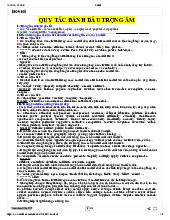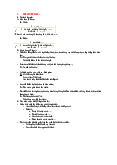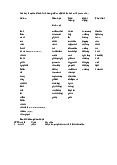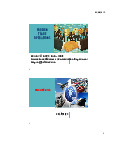



















Preview text:
VNU – ENGLISH PROFICIENCY TEST SAMPLE TEST
This test is to measure your proficiency in English. It consists of four sections with a total of approximately 175 minutes.
Section 1: Listening Comprehension (40-45 minutes) Section 2:
Reading Comprehension (60 minutes) Section 3: Writing (60 minutes) Section 4: Speaking (10 minutes)
Each section has specific directions. Be sure you understand what you are to do before working on each section.
Do not write your answers on the test booklet. All your answers must be blackened on your answer sheet.
ALL TEST BOOKLETS WILL BE COLLECTED AFTER THE TEST. www.etcvnu.edu.vn SECTION 1: LISTENING
The listening section, consisting of conversations and lectures, tests your English listening skil s.
There are four passages and 32 questions, which are based on either stated or implied information in the passages.
Each passage will be played twice. The questions will follow each passage. Each question has
four answer choices. Select the best answer for each question.
You may take notes while you listen and use your notes to answer the questions. VNU-EPT Sample test 2
PART ONE (20 pts)
Direction: In Part 1 you will hear ten conversations between two people. After the second listening
of each conversation, you will hear a question and there are four possible answers provided.
Select the best answer to each question.
1. (A) At a romantic restaurant 6. (A) $29 (B) In a law company (B) Nearly $30 (C) At Tom’s house (C) $39.99 (D) At a movie theater (D) $20.99 2. (A) In cash 7. (A) Interested (B) By debit card (B) Disappointed (C) By credit card (C) Annoyed (D) By check (D) Angry
3. (A) Buy some birthday cards
8. (A) The customer may be inexperienced. (B) Send some postcards
(B) The customer sends e-mail too often.
(C) Send some gifts to his six relatives
(C) The customer has an important
(D) Send some birthday cards to Peru business e-mail.
(D) He (the technician) knows what the 4. (A) Japan problem is. (B) The U.S (C) Kuwait 9. (A) Australia (D) Austria (B) Ireland (C) Scotland
5. (A) They are worried, so they cannot eat. (D) America
(B) They do not have enough time. (C) They are working.
10. (A) It was expensive.
(D) They will leave work in ten minutes. (B) It was cheaper.
(C) It was his girlfriend’s choice.
(D) It was more interesting than the trip to Japan. VNU-EPT Sample test 3
PART TWO (20 pts)
Direction: In Part 2 you will hear a conversation. After the second listening, there are six
incomplete sentences and four possible options provided for each gap. Select the best option to complete the sentence.
11. The topic of the radio program probably is
14. Julie probably tells herself “_____” if she “_____”. learns to ride a bicycle.
(A) Never think about past mistakes
(A) It will take me too much time. (B) How to be optimistic (B) I’ll fail again. (C) Be positive in failures
(C) I’ll never try again if I fail now.
(D) Always use positive language (D) I can ride it soon.
12. For Andy, _____ is very important.
15. Miriam says that we should _____ to improve our bad feelings. (A) living for today (B) keeping past memories
(A) do good things to other people (C) arranging for the future
(B) list all the things for a good future (D) avoiding mistakes
(C) keep a list of good memories at hand
(D) try to have a good time every week
13. Julie says people have negative thoughts _____.
16. Michael doesn’t want to say “I’m sorry” because he thinks _____. (A) if they fail in love (B) every time they fail
(A) it’s not good to admit a mistake (C) now and then
(B) action is more important than words (D) when they stop working
(C) it’s better to say “I know my mistake”
(D) positive language can encourage people better VNU-EPT Sample test 4 PART THREE (28 pts)
Direction: In Part 3 you will hear a talk. After the second listening, there are eight questions.
Select the best answer to each question.
17. What is the conversation mainly about?
21. What did his wife do for him before she left?
(A) Why and how a man lost his memory
(B) Things turn worse with a loss of
(A) She did charity and prayed for him. memory
(B) She took care of him for a long time.
(C) Life of a man who lost his memory
(C) She worked in a new center to take
(D) A lost memory: a broken family care of him.
(D) She got good treatment for him in the
18. Why did the man lose his memory? U.S. (A) He had an accident.
22. What happens when he meets his
(B) He has a virulent disease. children? (C) He’s getting old.
(D) He has a genetic brain disease.
(A) Sometimes he calls their names.
(B) They talk to him about their
19. What is a result of his problem? company. (C) He’s happy to see them.
(A) Everything continually gets refreshed
(D) He tells them they do not need to to him. come again.
(B) He lives a sad life in a hospital.
(C) He often gets lost and hurt.
23. What is probably his favorite TV
(D) His wife left him and remarried in the program? U.S. (A) A football match
20. If he says hello to a person at 8:00, when (B) A game show
will he probably say hello again? (C) A comedy (D) A movie (A) 8:07 (B) 8:05:07
24. What will the female speaker probably (C) 8:30 do? (D) 8:00:07 (A) Visit the sick man
(B) Bring the sick man a piano
(C) Playing the piano for the sick man
(D) Wait to see the sick man on TV VNU-EPT Sample test 5
PART FOUR (32 pts)
Direction: In Part 4 you will hear part of a lecture. After the second listening, there is a summary of
the lecture with eight gaps. Select the best option for each gap to complete the summary.
The professor gives a/an (25) _____ of 25. (A) explanation globalization, which emphasizes the (B) definition
acceleration and intensification of economic (C) clarification
transactions among people, companies and (D) argument
(26) _____. He then cites the U.S., the
26. (A) leaders of different continents
International Monetary Fund and the World
(B) different nations in many regions
Bank as the examples of (27) _____ and two
(C) governments of various countries
big international organizations that first involve
(D) similar governments of some nations
globalization. The professor also names Coca 27. (A) capitalism
Cola, McDonald, popular music and (28) _____ (B) imperialism
as representatives of U.S. cultural imperialism. (C) culturalism (D) popularism
In the first point of the lecture, the professor
indicates that critics object to globalization 28. (A) TV celebrities
because poor countries are often badly (B) computer programs (C) advertising programs
(29) _____ by international organizations to (i) (D) television shows
adjust currency, (ii) eliminate tariffs, (iii) respect
patents and copyright laws, (iv) privatize 29. (A) supported
(30) _____, and (v) not subsidize domestic (B) directed
goods. To illustrate his point, the professor (C) advised (D) financed
gives an example of (31) _____, which suffered
rather than prospered. The professor then cites
30. (A) large corporations
the opinion of critics to globalization that these (B) all public businesses
organizations do not have good intentions to (C) the business sector
help poor countries; they want to take (D) industry and banks
advantage of these countries instead. 31. (A) South Korea (B) South Africa
However, the professor suggests two more (C) Argentina
possible reasons for this practice. First, these (D) Indonesia
rules are also implemented to some extent in
rich countries. Second, poor countries which do 32. (A) investments (B) nonrefundable aids
not follow trade rules will not receive (32) _____ (C) technology transfer from rich countries. (D) economic counseling … VNU-EPT Sample test 6 SECTION 2: READING
The reading section tests your English reading skills. This section includes four reading passages
and 40 questions. Each question has four answer choices. Select the best answer choice. You
have 60 minutes to complete this section of the test.
The first passage tests your grammar and vocabulary.
The last 3 passages test your comprehension of the passages.
You may take notes and use your notes to answer the questions. VNU-EPT Sample test 7 PART ONE (40 pts)
Read the passage carefully.
TOURISTS IN A FRAGILE LAND
1 As a scientist working in Antarctica, I spend most of (33) _____ time in the lab studying ice. I
am trying to find out the age of Antarctic ice. All we know for certain is that it is the oldest ice
in the world. The more we understand it, the more we will understand the (34) _____
weather of the Earth. Today, as with an increasing number of days, I had to leave my work
to greet a group of tourists who were taking a vacation in this continent of ice. And even
though I can appreciate their desire to experience this vast and beautiful landscape, I feel
Antarctica should be closed to tourists.
2 Because Antarctica is the center of important scientific research, it must (35) _____
preserved for this purpose. Meteorologists are now looking at the effects of the ozone hole
that was discovered above Antarctica in 1984. They are also trying to understand global
warming. If the Earth’s temperature continues to increase, the health and safety of every
living thing on the planet will be affected. Astronomers have a unique view of space and are
able to see it very (36) _____ from Antarctica. Biologists have a chance to learn more about
the animals that inhabit the coastal areas of this frozen land. Botanists study the plant life to
understand how it can live in such a harsh environment, and geologists study the Earth to
learn more about how it was formed. There are even psychologists who study how people
behave when they live and work together in such a remote location.
3 When tourist groups come here, they take us away from our research. Our work is difficult, and
some of our projects can be damaged by such simple mistakes as opening the wrong door or
bumping into a smal piece of equipment. Tourists in Antarctica can also hurt the environment.
Members of Greenpeace, one of the world’s leading environmental organizations, (37) _____
that tourists leave trash on beaches and disturb the plants and animals. In a place as frozen
as Antarctica, it can take 100 years for a plant (38) _____ back, and tourists can easily
damage penguin eggs. Oil spills are another problem caused by tourism. Oil spil s not only kil
penguins but can also destroy scientific projects. VNU-EPT Sample test 8
4 The need to protect Antarctica from tourists becomes even (39) _____ when we
consider the fact that there is no government here. Antarctica belongs to no country.
Who is making sure that the penguins, plants, and sea are safe? No one is responsible.
In fact, we scientists are only temporary visitors ourselves. It is true that the number of
tourists (40) _____ visit Antarctica each year is small compared to the number of those
who visit other places. However, these other places are inhabited by local residents and
controlled by local governments. They have an interest in protecting their natural
environments. Who is concerned about the environment of Antarctica? The scientists, to
be sure, but not necessarily the tour companies that make money from sending people south.
5 If we don’t protect Antarctica from tourism, there (41) _____ be serious consequences for
us all. We might lose the results of scientific research projects. It’s possible that these results
could teach us (42) _____ about the causes and effects of climate change. Some fragile
plants and animals might die and disappear forever. This could damage the balance of
animal and plant life in Antarctica. We know from past experience that when things get
unbalanced, harmful changes can occur. Clearly, Antarctica should remain a place for
careful and controlled scientific research. We cannot allow tourism to bring possible danger
to the planet. The only way to protect this fragile and important part of the planet is to stop
tourists from traveling to Antarctica.
Task 1: Choose the best option A, B, C, or D for each gap. 33. (A) our (B) his (C) her (D) my 34. (A) changed (B) change (C) changing (D) changes 35. (A) have (B) be (C) make (D) do 36. (A) clearly (B) clarity (C) clear (D) unclearly 37. (A) complaining (B) complain (C) complaint (D) complained 38. (A) to grow (B) growing (C) grow (D) growth 39. (A) great (B) greater (C) greatest (D) most great 40. (A) which (B) whom (C) who (D) where 41. (A) would (B) need (C) ought to (D) may
42. (A) important thing (B) importance (C) importantly (D) something important VNU-EPT Sample test 9
Task 2: Choose the best option A, B, C, or D for each gap.
43. The word vast in paragraph 1 is closest in
48. The word remote in paragraph 2 is meaning to _____.
closest in meaning to _____. (A) very large (A) ideal (B) pretty (B) isolated (C) small (C) hostile (D) faraway (D) lonely
44. The word landscape in paragraph 1 is
49. The word disturb in paragraph 3 is
closest in meaning to _____. closest in meaning to _____.
(A) an area of land for living
(A) make somebody/something happy (B) a painting
(B) bring somebody/something comfort (C) an icy environment (C) annoy somebody/something
(D) the way an area of land looks
(D) cause somebody/something to die
45. The word preserved in paragraph 2 is
50. The word temporary in paragraph 4 is
closest in meaning to _____. closest in meaning to _____. (A) closed (A) rich and adventurous (B) explored (B) careful (C) protected
(C) lasting for a limited time (D) changed (D) responsible
46. The word inhabit in paragraph 2 is
51. The word consequences in paragraph 5
closest in meaning to _____.
is closest in meaning to _____. (A) avoid (A) acquaintances (B) cover (B) effects (C) prefer (C) causes (D) live in (D) disasters
47. The word harsh in paragraph 2 is closest
52. The word fragile in paragraph 5 is closest in meaning to _____. in meaning to _____. (A) unpleasantly difficult (A) native (B) mild (B) rare (C) dry (C) useful (D) cold (D) easily damaged VNU-EPT Sample test 10 PART TWO (14 pts)
Read the passage carefully.
The white face, dark eyes and hair, and blood red lips: both foreigners and the Japanese are
fascinated by these beautiful and mysterious women.
Makiko is training to be a geisha. Not many girls want to be a geisha in Japan today. Makiko’s
parents want her to go to university, study medicine and become a doctor. But Makiko’s
grandfather paid for her training and bought the kimonos she needed. It’s very expensive to
become a geisha. You have to have a different kimono for each month of the year, and today
a kimono costs three million yen, that’s about $30.000.
It’s a hard life for a trainee geisha. She has to leave her family and move to a special boarding
house called a ‘maiko house’. Here, she has to learn traditional Japanese arts such as playing
instruments, performing the tea ceremony, arranging flowers, singing and dancing. She has
to take many difficult tests and exams. Only the best will pass everything and become geishas many years later.
We asked Makiko to describe exactly what a geisha does.
‘A geisha has to serve customers and also entertain them. She has to sing and dance, and make good conversations.’
Did she enjoy her life as a trainee geisha?
‘I love it. But it’s hard work. Sometimes I get tired of wearing the kimonos and I want to put on
a pair of jeans and go to school like a normal teenager. But I can’t have a normal life now. I
don’t mind. I feel very lucky.’
And what about later? Can she have a family?
‘Of course. A geisha can have relationships like anybody else and she can get married when she chooses.’
In Japan today there are fewer than a thousand geishas, but they play an important role in
preserving Japanese culture and history. VNU-EPT Sample test 11
Choose the best option A, B, C, or D.
53. What is the main idea of the passage?
56. The word She in the passage refers to _____ (A) How to be a famous geisha
(B) Interesting life of geishas (A) Makiko (C) Life and work of geishas (B) A trainee geisha
(D) How geishas feel about their life (C) The writer (D) A family member
54. Why is Makiko training to be a geisha?
57. Why does the writer mention tea
(A) Her parents want her to do so. ceremony? (B) Her grandfather supported her financially.
(A) To express he/she likes tea
(C) She was lucky to be chosen.
(B) To indicate that geishas love tea
(D) Being a geisha is Makiko’s dream.
(C) To give an example of Japanese traditional arts
55. What is NOT a requirement for a geisha?
(D) To show that all Japanese drink tea in a special way
(A) She has to pass all difficult tests and exams.
58. The word them in the passage refers to
(B) She can’t stay home during the _____. training. (C) She has to learn music. (A) geishas
(D) She has to play modern instruments. (B) tests and exams (C) customers (D) conversations VNU-EPT Sample test 12 PART THREE (20 pts)
Read the passage carefully.
1 Climate encompasses the statistics of temperature, humidity, atmospheric pressure, wind,
rainfall, atmospheric particle count and other meteorological elements in a given region over a
long period of time. Climate can be contrasted to weather, which is the present condition of
these same elements and their variations over shorter time periods.
2 Climate may be inherently variable as evidenced by the irregularity of the seasons from one
year to another. This variability is normal and may remain partially understood. It is related to
changes in ocean currents, volcanic eruptions, solar radiation and other components of the
climate system. In addition, our climate has its extremes (such as floods, droughts, hail,
tornadoes and hurricanes), which can be devastating. However, in recent decades, a number
of indicators and studies show more and more evidence of climate warming across the globe.
It is a disturbing phenomenon challenging human habits and activities which are responsible for greenhouse gas emissions.
3 The greenhouse effect is the process by which absorption and emission of infrared radiation
by gases in the atmosphere warm the planet's lower atmosphere and surface. It was proposed
by Joseph Fourier in 1824 and was first investigated quantitatively by Svante Arrhenius in
1896. Naturally occurring greenhouse gases have a mean warming effect of about 33°C
(59°F). But human activity since the Industrial Revolution has increased the amount of
greenhouse gases in the atmosphere, leading to increased concentrations of CO2 and
methane. The concentrations of CO2 and methane have increased by 36% and 148%
respectively since 1750. These levels are much higher than at any time during the last
650,000 years. Over the last three decades of the 20th century, GDP (Gross Domestic
Product) per capita and population growth were the main drivers of increases in greenhouse
gas emissions. CO2 emissions are continuing to rise due to the burning of fossil fuels and land-use change.
4 There are two major effects of global warming: the increase of temperature on the earth by
about 3° to 5°C (5.4° to 9°F) by the year 2100, and the rise of sea levels by at least 25 meters
(82 feet) by the year 2100. Other consequences are listed below:
- Amounts and patterns of precipitation are changing.
- The total annual power of hurricanes has already increased markedly since 1975 because
their average intensity and average duration have increased.
- Changes in temperature and precipitation patterns increase the frequency, duration, and
intensity of other extreme weather events, such as floods, droughts, heat waves, and tornadoes.
- Lower agricultural yields, further glacial retreat, reduced summer stream flows and species extinctions.
- Diseases like malaria are returning to areas where they have been extinguished earlier. VNU-EPT Sample test 13




